 Petzlover
Petzlover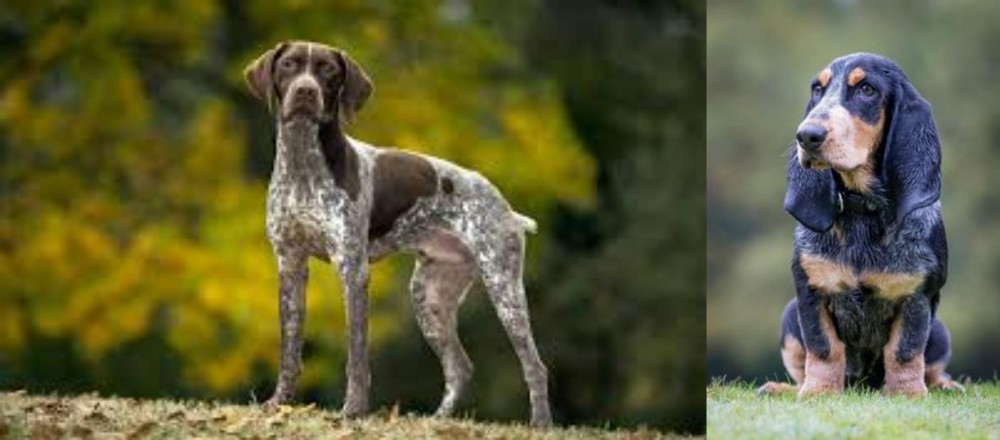 Both Braque Francais (Gascogne Type) and Petit Bleu de Gascogne are originated from France. Braque Francais (Gascogne Type) may grow 11 cm / 5 inches higher than Petit Bleu de Gascogne. Braque Francais (Gascogne Type) may weigh 12 kg / 27 pounds more than Petit Bleu de Gascogne. Both Braque Francais (Gascogne Type) and Petit Bleu de Gascogne has almost same life span. Braque Francais (Gascogne Type) may have more litter size than Petit Bleu de Gascogne. Both Braque Francais (Gascogne Type) and Petit Bleu de Gascogne requires Low Maintenance.
Both Braque Francais (Gascogne Type) and Petit Bleu de Gascogne are originated from France. Braque Francais (Gascogne Type) may grow 11 cm / 5 inches higher than Petit Bleu de Gascogne. Braque Francais (Gascogne Type) may weigh 12 kg / 27 pounds more than Petit Bleu de Gascogne. Both Braque Francais (Gascogne Type) and Petit Bleu de Gascogne has almost same life span. Braque Francais (Gascogne Type) may have more litter size than Petit Bleu de Gascogne. Both Braque Francais (Gascogne Type) and Petit Bleu de Gascogne requires Low Maintenance.
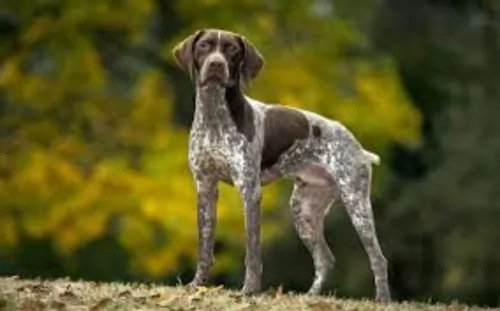 The Braques Français – Gascogne – is a hunting dog from southern France’s Gascony region. Known also as the French Gascony Pointer, this dog has descended from Spanish and Italian Pointers. The dog was saved from extinction at the turn of the 20th century.
The Braques Français – Gascogne – is a hunting dog from southern France’s Gascony region. Known also as the French Gascony Pointer, this dog has descended from Spanish and Italian Pointers. The dog was saved from extinction at the turn of the 20th century.
There are actually two breeds of Braque français, with the other being somewhat smaller and known as Braque français, type Pyrénées. Whichever one you have, they are popular hunting dogs in France. The first breed club was established in 1850.
 The Petit Bleu de Gascogne is a scenthound dog originating in France where he has always been used as a hunting dog.
The Petit Bleu de Gascogne is a scenthound dog originating in France where he has always been used as a hunting dog.
The Petit Bleu de Gascogne is a descendant of the Grand Bleu de Gascogne. This dog was developed around the 16th century already, with the numbers of the dog being reduced at the time of the World Wars.
They’re quite well known in France, but not in any other parts of the world. The dog is an official member of the UKC, and it was in 1991 that the dog joined their scent hound group.
 The Braque Francais is a dog which looks much like the German Short-haired Pointer. The Braque Francais (Gascogne) is a large breed dog, standing roughly 56 – 69cm. Weight is most times dependent on height, but the average weighs between 35 and 55 pounds. The dog is attractively lean and muscular and the tails have always been docked, although rules and regulations see the breed with a long tail these days. The natural tail of the Braque Francais is medium length. The eyes of this breed are brown or yellow and the ears are medium in length and floppy. The coat of the Gascogne is short and dense and in two colors – white and chestnut patching and mottling.
The Braque Francais is a dog which looks much like the German Short-haired Pointer. The Braque Francais (Gascogne) is a large breed dog, standing roughly 56 – 69cm. Weight is most times dependent on height, but the average weighs between 35 and 55 pounds. The dog is attractively lean and muscular and the tails have always been docked, although rules and regulations see the breed with a long tail these days. The natural tail of the Braque Francais is medium length. The eyes of this breed are brown or yellow and the ears are medium in length and floppy. The coat of the Gascogne is short and dense and in two colors – white and chestnut patching and mottling.
The dog is a keen tracker and is an excellent game and gun dog with some of them requiring more training than others. Training and socialization makes the Braque Francais an excellent, obedient pet who is eager to please and he is considered to be easily trainable, learning quickly. He loves his human family and is noted for his gentle, friendly nature, and he therefore makes and excellent family pet where there are children and other pets.
 The Petit Bleu de Gascogne is a medium to large sized dog which stands at between 52 to 58cm in height at the withers and weighs in the region of 18 to 22kg.
The Petit Bleu de Gascogne is a medium to large sized dog which stands at between 52 to 58cm in height at the withers and weighs in the region of 18 to 22kg.
In fact, the only difference between the Petit Bleu de Gascogne and the original Bleu de Gascogne is its size. They’re well proportioned dogs and they have lean, muscular bodies. The head is long and slim, the nose black, the expression gentle and unthreatening.
Most times you’ll find a black patch on each side of the head which extends to the ears so that the ears are essentially black. The patch also extends to around the eyes.
The dense, short coat is a typical trademark feature, with the color of the coat being white mottled with black so that the general appearance is a slate blue color. The dog usually has tan eyebrows over each eye. The tail is long and the ears long and floppy.
Kept essentially as a pet today, the Petit Bleu de Gascogne has kept its hunting instincts and is an excellent scent-dog, being able to follow a scent for miles. It is why you want to ensure that as a pet, you take him on regular walks, every day in fact. He just loves to get out, and given the chance to run and chase a scent.
Apart from his hunting skills, he still makes an excellent pet, being loyal and loving with his human family. He is looked upon as being amicable and well-balanced, getting on well with children as well as dogs in the home.
They’re quite laid-back and friendly, so they don’t make particularly good watchdogs. They are independent and intelligent and will respond well to training and socialization.
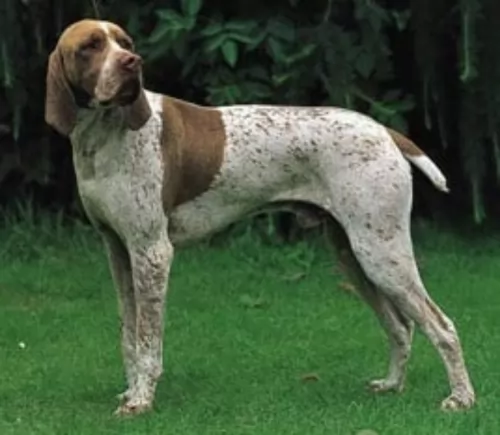 The attractive Braque Francais is a calm, contented dog who is also affectionate, social and intelligent. He is already a well mannered dog but will do even better with training and socialization. However, Braque Francais don’t take well to aggressive training and done the wrong way, the dog can end up being timid and confused.
The attractive Braque Francais is a calm, contented dog who is also affectionate, social and intelligent. He is already a well mannered dog but will do even better with training and socialization. However, Braque Francais don’t take well to aggressive training and done the wrong way, the dog can end up being timid and confused.
Wanting to please and being an intelligent dog, training should be fun, lighthearted but firm. In exchange you’re going to have an awesome friend from this wonderful, loving dog breed.
 The Petit Bleu de Gascogne just loves being outdoors, chasing the scent of something interesting. He is in his element outside as a hunting or tracking dog.
The Petit Bleu de Gascogne just loves being outdoors, chasing the scent of something interesting. He is in his element outside as a hunting or tracking dog.
Training and socialization will always be a good idea for these dogs, as once on the scent he may be inclined to ignore your calls and not return easily.
They’re easy-going dogs, loving be around their human family. Provide well for him and you will find that he makes an amicable, loyal and devoted companion.
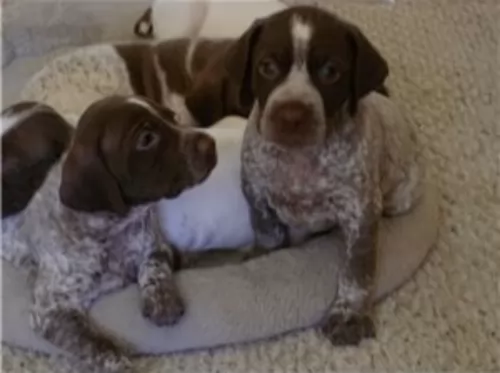 You won’t find many health issues with this active breed but nonetheless hip and joint issues will need to be watched. If you are considering a Braque Français puppy, you’ll want to be selective in choosing a responsible breeder. A healthy puppy with the right environment, can get to up to 15 years of age.
You won’t find many health issues with this active breed but nonetheless hip and joint issues will need to be watched. If you are considering a Braque Français puppy, you’ll want to be selective in choosing a responsible breeder. A healthy puppy with the right environment, can get to up to 15 years of age.
Ectropion and entropion in dogs affect their eyelids. Ectropion is where the eyelids roll outward, whereas entropion is where the eyelids curve inward, irritating the eye. Because visual and skeletal problems occur in this breed, it can be recommended that owners have their pets tested by both the Canine Eye Registration Foundation as well as the Orthopedic Foundation for Animals.
 The Petit Bleu de Gascogne is a healthy dog with no unusual health problems being documented. With good care, he can generally live to be 11, 12 or 13 years of age. Nonetheless it is a good idea to be aware of some of the horrible dog illnesses that can strike, even though it is highly unlikely.
The Petit Bleu de Gascogne is a healthy dog with no unusual health problems being documented. With good care, he can generally live to be 11, 12 or 13 years of age. Nonetheless it is a good idea to be aware of some of the horrible dog illnesses that can strike, even though it is highly unlikely.
Your Petit Bleu de Gascogne is a deep chested dog and this simply means it can develop bloat. A swollen stomach, lethargy and trying to vomit are just some of the signs of this ailment which can become deadly if not attended to. The stomach can twist with bloat and this is when things get serious.
Floppy eared dogs are always at risk of ear infections and these can be painful for your pet. You will notice him scratching at his ears or shaking his head and then its time to investigate further for redness or discharge.
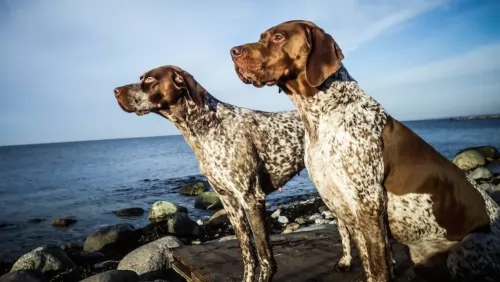 Brushing the coat twice a week will get rid of loose hairs and maintain the sheen of the coat. Also, as a floppy eared breed, attention should be given to the ears to prevent infections. He will also need to have his teeth brushed with dog toothpaste and brush to prevent the build-up of damaging plaque and his nails will also require a clipping if they don’t manage to wear down naturally.
Brushing the coat twice a week will get rid of loose hairs and maintain the sheen of the coat. Also, as a floppy eared breed, attention should be given to the ears to prevent infections. He will also need to have his teeth brushed with dog toothpaste and brush to prevent the build-up of damaging plaque and his nails will also require a clipping if they don’t manage to wear down naturally.
Daily activity will be needed for this dog and he will want a walk every day. He certainly isn’t a dog you can leave indoors or outside in your backyard day after day. Any activities that require physical exertion will be good because they are exceptional athletes. If you are a cyclist or a runner, take him with you – he’ll love it.
Your Braque Francais loves energetic activities and for this he will require an excellent nutrient-rich diet. Nutrient-rich dog foods are higher in protein and fat and lower in carbohydrates. It’s important to check out the carbohydrate content in commercial dog foods to avoid those one high in carbohydrates.
Your vet can always advise you on a good quality food and you can always give him your own home-prepared foods which include rice, vegetables and meat. Certainly include some raw meat into his diet every now and then to avoid skin problems. Fresh, cool water must be available to him night and day.
 Luckily the Petit Bleu de Gascogne is a fairly low maintenance dog who will basically require a good brush twice a week to rid him of loose hairs and to keep his coat nice and shiny.
Luckily the Petit Bleu de Gascogne is a fairly low maintenance dog who will basically require a good brush twice a week to rid him of loose hairs and to keep his coat nice and shiny.
Take the time while brushing him to test for any unusual lumps on his body. Check inside his ears too, because as a floppy eared dog, there can be a build-up of wax, debris and dampness and these can all cause bacteria and an ear infection.
Check his eyes too as well as inside his mouth. He can’t tell you when he’s got terrible tooth ache from a rotting tooth and you need to check for this. Bad teeth can cause all kinds of health issues.
There are some excellent commercially manufactured dog foods on the market which have got the vitamins and minerals your pet needs. Some of the lower quality foods have got bad ingredients such as colorants and fillers and these can actually be toxic for your pet.
It’s always wise to add a little bit of home-made food into your pet’s diet and then simple, nutritious foods such as boiled chicken, brown rice or pasta, sweet potatoes, carrots and spinach can do him the world of good. Just chop it up and add it into the dried kibble every other night when you feed your pet. A bit of raw meat occasionally can also be healthy for him.
Always ensure there’s a bowl of fresh, cool water available to him.
Ensure your pet has a nice comfortable, dry place to sleep.
Never ever leave your pet alone in a hot car.
Make sure your puppy has his puppy vaccines to avoid some life-threatening diseases.
Have your dog spayed or neutered to avoid unwanted puppies.